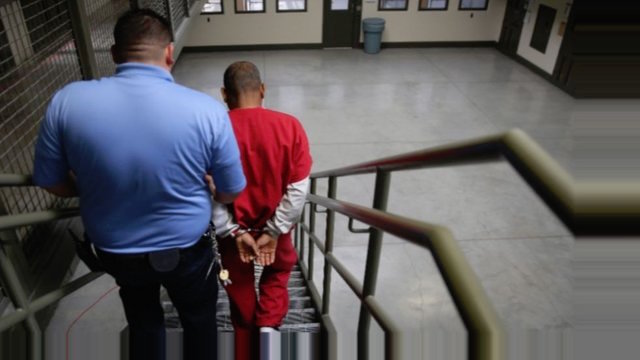
What Is a Criminal Justice Degree?
Criminal justice is a very broad field that encompasses our criminal justice system and a number of peripheral organizations. This includes law enforcement, the courts, correctional facilities, lawyers, and more. If a career has to do with identifying crimes and criminals, apprehending them, judging them, punishing them, rehabilitating them, or implementing policies that affect these other areas, it falls under the umbrella of criminal justice. A criminal justice degree is what you earn after pursuing academic study in any of these areas. There are multiple types and levels of criminal justice degree.
The most basic criminal justice degree one can earn is the Criminal Justice Certificate. These are typically earned after you’ve completed technical training in a specific area of the field. Certificates can lead to careers as police officers, correctional officers, crime scene photographers, and other similar positions.
The first undergraduate degree you can earn in criminal justice is an associate degree. In this program, you would take a few foundational courses in crime theory, court systems, and law enforcement. Some agencies that formerly accepted certificates are now calling for their candidates to have a little more experience and this is the type of program that is perfect for that. Paralegals, border patrol agents, law enforcement, customs inspectors, and bailiffs can get started in their field with this degree.

The next undergraduate criminal justice degree you can earn is the most common, and that is a Bachelor’s in Criminal Justice. These are usually four-year programs, and they explore the fundamentals of criminal justice at a deeper level than an associate’s degree. You can also choose to add an area of focus to your degree at this level, tailored to the career you want.
After that, there are graduate degrees in criminal justice. If you are interested in working in substance abuse counseling, social work, criminal investigation, education, or forensic science, a master’s in criminal justice will open you up to those possibilities. These programs are typically two to three years of study beyond the bachelor’s level and allow you to explore specific aspects of criminal justice. The courses you take will build on the foundation that was laid throughout your undergraduate study.
There are two types of doctoral degrees in criminal justice. These are the Doctor of Criminal Justice and the PhD in Criminal Justice. These programs lead to high-level careers in administration, research, academia, policy-making, law, and more.
What Can I Do With A Doctorate or PhD in Criminal Justice?

Doctorate degrees are the pinnacle of education in America, and this rings true for the field of criminal justice. There are two main types of doctorate degree in criminal justice, and each of them is going to have their own professional application as well as some overlap.
A Doctor of Criminal Justice is a more applied type of degree. Because this is still evolving as a program, there are not many schools that offer them. You can take this degree as a practice-focused program which would explore the topics you’ll encounter in your professional practice and help you to hone your skills in your chosen area of the field. Some DCJ programs require a dissertation, and some do not.
A PhD in Criminal Justice is almost purely academic in nature. You will take a lot of the same courses, exploring certain topics deeper based on the aspect of criminal justice you choose to focus on. However, all PhD programs are going to include classes that equip you with skills in research. You will learn about research methodologies, statistics, data analysis, and more.
With either degree, you will be opening up a lot of career doors. You could get a job teaching criminal justice in a higher education setting. You could work in leadership or management positions in law enforcement, corrections, in the court system, or some other related field. You could work as a judge, a lawyer, a forensic psychologist, or something like that. You could also find a research-based career working for a governmental agency, in the private sector, or for a business. Criminology research, security research, criminal justice policy research, the possibilities are essentially endless because of the scope of the field.
There are a lot of different jobs in the criminal justice field because it’s very broad and a doctorate or PhD in Criminal Justice will qualify you for nearly all of them because it is the highest level of education you can possibly obtain.
How Long Does it Take to Get a Criminal Justice Degree?

The amount of time it takes to earn any type of degree is going to vary greatly. There are different levels of criminal justice degree, and then you have to consider the individual factors that are different for all students. Some things that affect how long it can take you to earn your degree include whether you are studying full-time or part-time, if you had any credits that transferred, how many credits you have to complete, if any of your prior experience counted for credit, and more.
Bachelors degrees are what most jobs in the field of criminal justice call for. On average, these programs take four years to complete. However, if you have any college credit from prior experience, or if you find an accelerated degree program, you can finish it much faster. Some programs can be completed in as little as one to two years. These degrees typically comprise 120 credits, and while some may include an internship of some sort, it is mostly just coursework.
Masters degrees are required for more specialized careers in criminal justice and are around 30-40 credits depending on the school and program that you select. There are a lot of masters programs that can be completed in just one year but the average amount of time it takes is two years. There is a lot of coursework required, but with this type of degree, you may see more field experience (typically called practicum hours). Some of these programs will include a capstone project or thesis, which includes a lot of independent study as well.
Doctoral programs take the longest because there is a lot of work associated with earning such a high-level degree. Most of them require you to hold a masters degree in a related field, so you will have already spent a few years in school by the time you’re ready to enter. There are some criminal justice doctorates that will require you to have had a certain amount of work experience as well; while this doesn’t necessarily count, it can lead to it taking longer for you to get the degree.
A PhD in Criminal Justice can be earned in as little as three years when you study at an aggressive pace. However, you’ll need to keep in mind that these programs usually include a minimum of 50-60 credits worth of coursework and then you will be tasked with completing comprehensive examinations and a dissertation. There is a lot of independent study and research you’ll need to do on top of an already advanced course load. The average student takes about five years to earn their PhD.
What Jobs Can You Get With a Criminal Justice Degree?

The scope of criminal justice, as you’ve read, is a very broad one. You can find jobs in law enforcement, corrections and rehabilitation, government and policy, the court system, and more. Below is a list of some of the most common careers in the field.
- Police Officers
- Corrections Officers
- Bailiffs
- Homeland Security Agents
- Private Detectives
- Fish and Game Wardens
- FBI Agents
- Criminal Investigators
- Criminal Justice/Law Enforcement Teachers
- Social Workers
- Judges
But don’t feel limited! There are positions in victim advocacy, forensic science, criminal analysis, and so many others. If you’re willing to put the work in academically, you can reap the rewards professionally.
At the undergraduate level, criminal justice degree programs are focused on familiarizing students with the basic concepts of criminal justice. These degree programs will prepare you for more entry-level careers. You will study the way that the criminal justice system works, including the courts and correctional facilities. You will take classes that teach you about the theory of crime causation, policies of crime control, basic criminal psychology, and other vital components of criminal justice. If you choose to select a focus area for your bachelor’s degree, you’ll take a handful of classes that deepen your knowledge in that area as well.
At the graduate level, that is when you can begin to tailor your education in a specific direction. You can choose to specialize in almost any aspect of criminal justice, whether that is social work, counseling, criminology, criminal law, or something else. This more specialized education prepares you for more technical careers.
Some concentrations that you may want to consider include Computer Forensics, Corrections, Counterterrorism, Criminal Investigation, Criminal Justice Administration, Criminal Psychology, Criminology, Cybersecurity, Emergency Management, Forensic Accounting, Forensic Nursing, Forensic Psychology, Forensic Science, Homeland Security, Law Enforcement, Legal Nursing, Public Administration, Security Management, or Sociology.
What is the Average Criminal Justice Salary?

There is no straightforward answer to this question simply because the field of criminal justice encompasses so many different careers. Your salary can be affected by your geographical location, your level of education, and your level of career experience, among other things.
Here is a variety of common careers you could have if you’ve earned a bachelors degree in criminal justice and their average salaries.
- Police Officer: $64,490
- Correctional Officer: $47,600
- Paralegal: $53,910
- Criminal Investigator: $83,320
- Private Detective: $55,080
Of course, higher levels of education are associated with higher salaries as well as higher rates of job satisfaction. Some common careers you could have with a masters degree in criminal justice and their salaries are as follows.
- Police Supervisor: $87,910
- Forensic Psychologist: $77,030
- District Attorney: $119,250
- Emergency Management Director: $81,140
- Security Management Consultant: $105,610
The PhD in Criminal Justice is the highest academic honor in the field and will, of course, open up opportunities for higher paying careers due to the advanced level of education you will have received. Some potential careers and their average salaries are listed below.
- Crime Analyst: $77,210
- Chief of Police: $106,479
- Senior Researcher: $107,767
- Professor: $70,512
- Judge: $163,350
What Organizations or Associations Can I Join as a Criminal Justice Professional?

Joining a professional organization or association is great. Being a member of a group like this will help you build a stronger network within your field, and it can provide you with access to professional development resources, along with just boosting your resume. Right now, there are only a few such groups.
The American Correctional Association is for correctional officers and correctional support staff. It offers training, support, and operational guidelines or standards to correctional facilities.
The National Association of Chiefs of Police provides support to those who work in law enforcement.
The National Association of Fire Investigators exists to provide important resources and continuing education to those in the profession.
The National Association of Forensic Counselors is focused on fostering skills in the counseling, treatment, evaluation, supervision, and management of those who are criminal offenders. It offers professional development, education, and support to all of those in a forensic counseling profession.
There is also the National Criminal Justice Association which is an all-encompassing group that represents multiple levels of government. This group’s primary focus is on crime control and prevention in communities nationwide.
 Criminal Justice is a very broad field that encompasses the entire justice system of the United States. It is made up of law enforcement officials, lawyers, judges, and a number of other peripheral positions. Now, you may already be a professional in one of those positions or have aspirations to be, you could be an educator, or in a number of other positions where you interact with the justice system at the professional level; regardless of where you fall in that list, earning a PhD in Criminal Justice may be a great option for you to expand your knowledge and advance in your career.
Criminal Justice is a very broad field that encompasses the entire justice system of the United States. It is made up of law enforcement officials, lawyers, judges, and a number of other peripheral positions. Now, you may already be a professional in one of those positions or have aspirations to be, you could be an educator, or in a number of other positions where you interact with the justice system at the professional level; regardless of where you fall in that list, earning a PhD in Criminal Justice may be a great option for you to expand your knowledge and advance in your career.
 The California University of Pennsylvania was the first accredited school in the nation to offer an online criminal justice doctorate program. Its online Doctor of Criminal Justice is a 42-credit program that is designed to deepen your understanding of current issues in the area of criminal justice as well as strengthen your skills in analysis, policy implementation and evaluation, and more.
The California University of Pennsylvania was the first accredited school in the nation to offer an online criminal justice doctorate program. Its online Doctor of Criminal Justice is a 42-credit program that is designed to deepen your understanding of current issues in the area of criminal justice as well as strengthen your skills in analysis, policy implementation and evaluation, and more. Liberty University offers an online Doctor of Philosophy in Criminal Justice. The average student can finish this program in just three years, but it could take you shorter or longer depending on your individual circumstances and needs. You can transfer in up to 15 credits from prior college experience towards this degree, which consists of 60 credits in total.
Liberty University offers an online Doctor of Philosophy in Criminal Justice. The average student can finish this program in just three years, but it could take you shorter or longer depending on your individual circumstances and needs. You can transfer in up to 15 credits from prior college experience towards this degree, which consists of 60 credits in total. Nova Southeastern University offers an online PhD in Criminal Justice that has an interdisciplinary focus to help you broaden your entire skill set in the field and help you to advance your career. Concentrations are offered in Organizational Leadership, Behavioral Science, and Juvenile Justice. You can graduate in just three years.
Nova Southeastern University offers an online PhD in Criminal Justice that has an interdisciplinary focus to help you broaden your entire skill set in the field and help you to advance your career. Concentrations are offered in Organizational Leadership, Behavioral Science, and Juvenile Justice. You can graduate in just three years.





